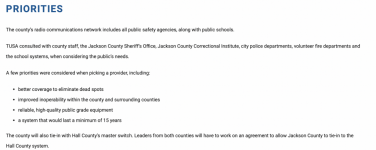When a system encrypts non-sensitive communications like the water department or school busses, their encryption philosophy becomes untethered from arguments about bad actors being able to misuse law enforcement or other communications, whether they be burglars, protesters, street racers, or otherwise. If the school bus and sanitation communications are encrypted, you know you're dealing with a jurisdiction that simply doesn't desire its citizenry to be aware of what it's government is doing in real time - at that point it's a philosophical thing about whether any local government radio communications ought to be heard by anyone who doesn't receive a W-2 from the government entity, and not about officer safety or anything of the sort. For better or worse.
So when it comes to encryption, once you know whether you are dealing with a jurisdiction that is concerned about protecting certain communications that arguably warrant protection vs. a jurisdiction that philosophically doesn't think citizens ought to know anything about what's happening in the county, then you know whether they'd be open to putting fire dispatches on an unencrypted talkgroup to solve a reception issue. If they don't want you to be able to know what school bus drivers are telling their dispatcher, you can be assured they place the secrecy of their even-non-sensitive government conduct ahead of any concern about whether individual fire or EMS calls might be missed or delayed.


